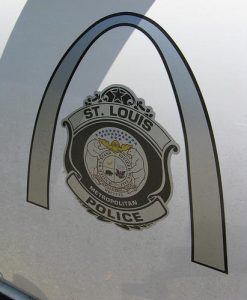 Wording of law prevents fair collective bargaining for police, union says
Wording of law prevents fair collective bargaining for police, union says
In an effort to effectively bargain a third contract for their members, the St. Louis Police Officers Association (SLPOA) is fighting to overturn a city charter requirement that police officers and fire fighters be paid the same rates of pay.
“This is not an anti-fire fighter issue, but rather a pro-police officer’s issue,” said SLOPA Business Manager Jeff Roorda.
He points out that the way the parity law is written, if police officers get a raise, the fire fighters automatically get the same increase: parity. However, if the fire fighters get a raise, it does not apply to police officers.
“This puts us in a terribly disadvantageous bargaining position,” Roorda pointed out, noting that city bargainers said they would “absolutely have agreed to larger police raises were it not for parity.”
The union’s current contract expires June 30, 2017. However, earlier this year, on a wage reopener, the union won a $2,000 across-the-board raise for FY 16-17 for police officers. The fire fighters got the same raise even though they had negotiated a smaller raise in their current contract, Roorda added. Local 73 is coming off a three-year contract this year and negotiations are expected to begin this month.
“We had to make concessions, including pension concessions, in order to get the $2000 raise. That is the problem; we made significant concessions for the raise but the fire fighters didn’t have to make the same concessions yet they got the same raise. My members should not have to give things up so another group of employees can benefit,” Roorda pointed out.
Again, Roorda reiterated this is not a police vs fire fighters issue, only an issue of fairness to his officers.
TRAINING GROUND
Roorda said that because of the city’s hesitation to raise officers’ salaries, the city police department has become a training ground for St. Louis County departments where pay is often considerably higher.
“If we were just able to retain the officers we’re losing, we’d be able to save hundreds of thousands of dollars a year.”
According to the police department, the city is 117 officers short of its authorized strength of 1,300. “We can’t even meet authorized strength because we don’t pay enough,” Roorda stressed.
Fire Fighters Local 73 President Demetris “Al” Alfred agreed that this is not, and should not, be an issue of police vs fire fighters.
“We support our brothers in blue. They certainly deserve a raise. But to use us as an excuse for not doing what’s right by them is terrible. This is a clear example of the city trying to play one group against the other. The parity agreement doesn’t prevent the city from giving the police a deserved raise. They’re using it as a negotiating ploy.”
FIRE FIGHTERS FELT DISADVANTAGED
The parity requirement was the result of a city charter amendment organized and championed by Fire Fighters Local 73 in 1970 whose pay scales at the time were tied to other city employees and thus not advancing commensurate with their putting their lives on the line in the same manner that the better paid police officers do as well.
Fire fighters salaries were controlled by the city, police officers by Jefferson City where the concern for the city’s overall budget was not as pressing as it was in city government, thus legislators were more willing to keep police happy with continuing raises. As a result, fire fighters pay fell substantially behind that of police officers.
Because fire fighters had a heavy lobbying presence in Jefferson City, it was agreed then that if fire fighters could lobby the legislature for better police pay, and they were tied at the hip, fire fighters could see pay increases commensurate with their same risk of life and limb. Police officers had no objection to this tactic. The city charter amendment passed as a result of heavy promotion by Local 73.
TURNED ON ITS HEAD
Today, however, the situation has been completely turned on its head.
With the city regaining control of the police department in 2013, police officers for the first time had the ability to bargain with the city for their wages and conditions.
 However, Roorda pointed out, because of the way the parity law is written, any raise now negotiated by police would automatically be applied to fire fighters, and that has given the city pause because of its impact on their budget.
However, Roorda pointed out, because of the way the parity law is written, any raise now negotiated by police would automatically be applied to fire fighters, and that has given the city pause because of its impact on their budget.
In their lawsuit, the SLPOA has noted that “city bargaining representatives have said that ‘but for parity,’ it could offer police officers higher salaries.”
As a result of the city charter’s requirement, the police officers suit claims they are being denied their right to collective bargaining as guaranteed by the Missouri Constitution, that the police/fire fighter connection “interferes with SLPOA’s ability to negotiate for and protect the interests (of) police officers,” thus violating the Missouri Constitution.
(Some information from reports from the St. Louis Post-Dispatch.)


